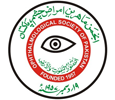ISSN 0886-3067



Volume No 37 Issue No 4
Outcomes of Squint Surgery in Terms of Motor Alignment within 10 Prism Diopters in a Tertiary Care Hospital: A Clinical Audit
Purpose: To determine the outcome of squint surgery in terms of motor ocular alignment within 10 prism diopters, in a tertiary care hospital. Study Design: A clinical audit at a tertiary care hospital. Place and Duration of Study: The study was conducted in Ophthalmology department, of Aga khan university hospital, Karachi between December 2016 and June 2017. Methods: Medical records of all patients who underwent squint surgery were retrieved and included in the study. Patients with amblyopia, corneal or retinal pathologies and those who lost to follow-up or with incomplete records were excluded. All the available demographic and clinical data including pre-operative visual acuity, squint measurements, procedure performed and post-operative ocular alignment up to maximum of 6 months of follow-up was compiled. Results: One hundred and nineteen patients fulfilled the inclusion criteria. There were 54.6% males and 45.4% were females. Squint was unilateral in 75.4% of patients and bilateral in 24.5%. Exotropia was present in 74 (62%) and Esotropia in 45 (38%) patients. The frequency of post-operative outcomes among the study participants were analyzed and it was reported that at six months follow-up central straight eye position or squint less than 10 prism diopters was seen among 75.5% of patients. The association of age and gender with primary outcome was obtained by applying independent sample T test. All the categories of age and gender showed statistically significant results i.e. p-value ? 0.05, except one week follow-up among different categories of gender showing insignificant results with p value = 0.740. Conclusion: In present study 75.5% patients achieved the required result of ocular alignment within 10 prism diopters of orthotropia at the final follow-up visit.
HTML Full Text | Complete PDF